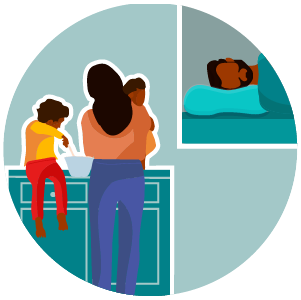COVID-19: What to Do If You Are Sick
Steps to care for yourself and help prevent the spread of COVID-19
Source: Centers for Desease Control and Prevention
What to do if sick: 10 steps to take
If you are sick with COVID-19 or suspect you are infected with the virus that causes COVID-19, follow the steps below to mange your health at home and help prevent the disease from spreading to people in your home and community.
Get a COVID-19 viral test
If you have symptoms of COVID-19, get tested. While waiting for test results, stay away from others, including staying apart from those living in your household. Visit your local health department’s website to look for testing sites.


Separate yourself from other people
As much as possible, stay in a specific room and away from other people in your home. Use a separate bathroom, if available. If you need to be around other people in or outside of the home, wear a mask.
Tell your close contacts that they may have been exposed to COVID-19. An infected person can spread COVID-19 starting 48 hours (or 2 days) before the person has any symptoms or tests positive
Call ahead before visiting your doctor
Call ahead. Many medical visits for routine care are being postponed or done by phone or telemedicine.
If you have a medical appointment that cannot be postponed, call your doctor’s office, and tell them you have or may have COVID-19. This will help the office protect themselves and other patients.
Cover your coughs and sneezes
Cover your mouth and nose with a tissue when you cough or sneeze.
Throw away used tissues in a lined trash can.
Immediately wash your hands with soap and water for at least 20 seconds. If soap and water are not available, clean your hands with an alcohol-based hand sanitizer that contains at least 60% alcohol.
Clean your hands often
Wash your hands often with soap and water for at least 20 seconds. This is especially important after blowing your nose, coughing, or sneezing; going to the bathroom; and before eating or preparing food
Use an alcohol-based hand sanitizer with at least 60% alcohol if soap and water are not available.
Avoid touching your eyes, nose, and mouth with unwashed hands.
Avoid sharing personal household items
Do not share dishes, drinking glasses, cups, eating utensils, towels, or bedding with other people in your home.
Wash these items thoroughly after using them with soap and water or put in the dishwasher.
Clean all “high-touch” surfaces everyday
Monitor your symptoms
Symptoms of COVID-19 include fever, cough, or other symptoms.
Stay in touch with your doctor. Call before you get medical care. Be sure to get care if you have trouble breathing, or have any other emergency warning signs, or if you think it is an emergency.
For medical emergencies, call 911
Look for emergency warning signs* for COVID-19. If someone is showing any of these signs, seek emergency medical care immediately:
- Trouble breathing
- Persistent pain or pressure in the chest
- New confusion
- Inability to wake or stay awake
Pale, gray, or blue-colored skin, lips, or nail beds, depending on skin tone
*This list is not all possible symptoms.



Use this CDC self-checker to help you make decisions about seeking appropriate medical care.

Stay home except to get medical care
Most people with COVID-19 have mild illness and can recover at home without medical care. Do not leave your home, except to get medical care. Do not visit public areas.
Take care of yourself. Get rest and stay hydrated. Take over-the-counter medicines, such as acetaminophen, to help you feel better.








You might consider a self-test if you have symptoms and can’t get tested by a healthcare provider.
Health Departments

Clean and disinfect high-touch surfaces in your “sick room” and bathroom; wear disposable gloves. Let someone else clean and disinfect surfaces in common areas, but you should clean your bedroom and bathroom, if possible.
If a caregiver needs to disinfect a sick person’s bedroom or bathroom, they should do so on an as-needed basis. The caregiver should wear a mask and disposable gloves.



Stay home except to get medical care
Most people with COVID-19 have mild illness and can recover at home without medical care. Do not leave your home, except to get medical care. Do not visit public areas.
Take care of yourself. Get rest and stay hydrated. Take over-the-counter medicines, such as acetaminophen, to help you feel better.





Clean all “high-touch” surfaces everyday
Clean and disinfect high-touch surfaces in your “sick room” and bathroom; wear disposable gloves. Let someone else clean and disinfect surfaces in common areas, but you should clean your bedroom and bathroom, if possible.
If a caregiver needs to disinfect a sick person’s bedroom or bathroom, they should do so on an as-needed basis. The caregiver should wear a mask and disposable gloves.

Isolating yourself
Look for emergency warning signs* for COVID-19. If someone is showing any of these signs, seek emergency medical care immediately:
- Trouble breathing
- Persistent pain or pressure in the chest
- New confusion
- Inability to wake or stay awake
Pale, gray, or blue-colored skin, lips, or nail beds, depending on skin tone
*This list is not all possible symptoms.


